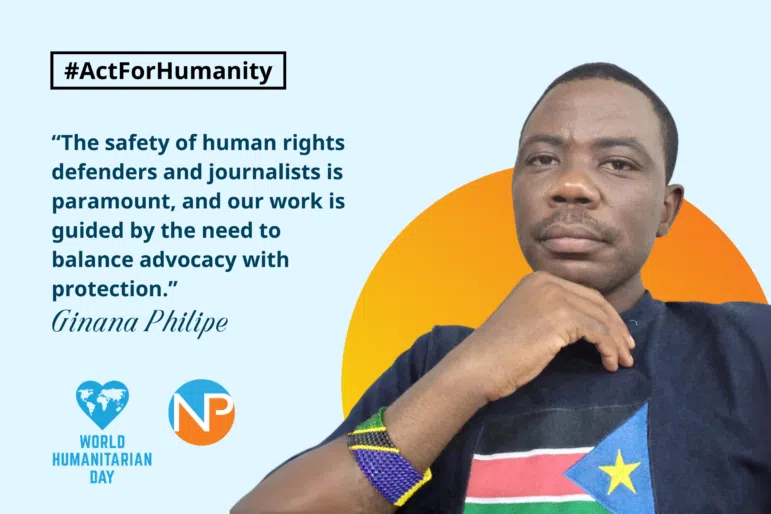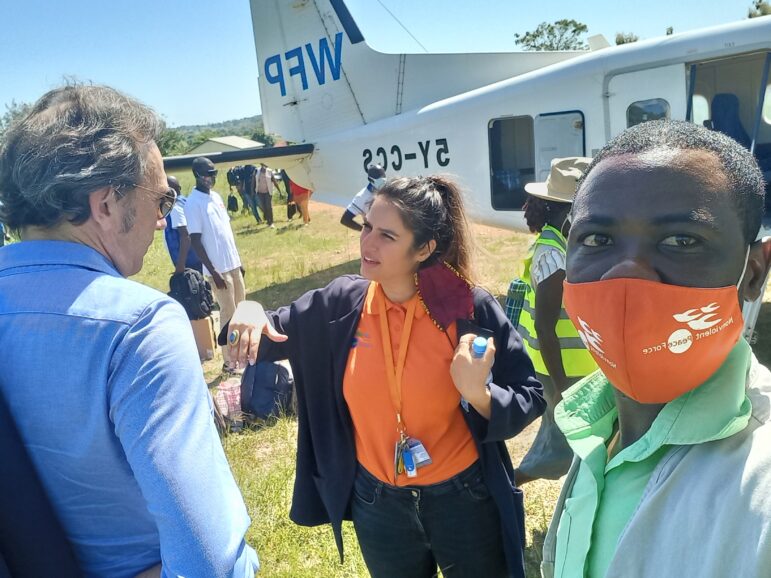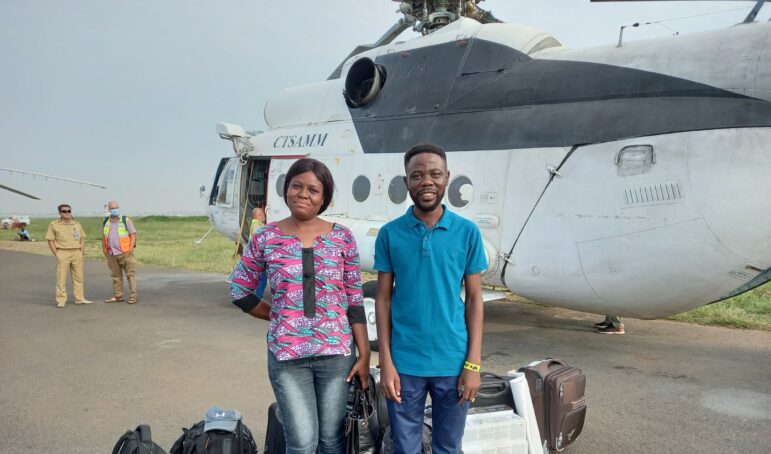#ActForHumanity with Philipe
Ginana Philipe on Safety for Human Rights Defenders and Journalists in South Sudan
"The safety of human rights defenders and journalists is paramount, and our work is guided by the need to balance advocacy with protection."

Join us for a conversation with Ginana Philipe, NP Senior Protection Specialist in South Sudan, as part of our series for World Humanitarian Day 2024. Philipe shared his insights on the critical role of digital literacy in this vital area of work, along with the challenges and strategies his team employs.
Q: Philipe, can you start by telling us a bit about your background and what led you to this line of work?
Although I was born in South Sudan, I spent most of my life in Uganda, where I completed my education and graduated before returning to South Sudan in 2011, just before the country gained independence. My roots are in the Western Equatoria State of South Sudan.
My career has been deeply intertwined with human rights. I identify myself as a human rights activist and lawyer, focusing on advocacy and protection. My journey into humanitarian work is driven by a profound commitment to saving lives and creating safe spaces for others. From the start, I felt a strong sense of purpose to serve humanity, which has guided me throughout my career.
Despite exploring other career paths, none aligned with my values, aspirations and goals as closely as humanitarian work. I was drawn to this field because I wanted to make a direct and meaningful impact, particularly in advancing rights and ensuring safety for those in need. Since 2011, I have been part of the humanitarian world, serving people in various capacities. In 2017, I began supporting human rights defenders, contributing to their safety in diverse ways, including digital literacy.
My focus on protecting human rights defenders and journalists is rooted in a deep-seated belief in advocating for and safeguarding the most vulnerable. I am driven by the desire to create safer environments where individuals and communities can thrive, which has steered me through various roles in humanitarian protection. My goal is to ensure that those who work to uphold human rights can do so without facing undue risk.

Q: What does being a humanitarian mean to you, especially in the context of protecting those who protect others?
For me, being a humanitarian means dedicating oneself to the service of others, striving to save lives, and creating a safe environment for those who are also working to make a difference. It's about advancing causes that promote life and dignity in any form. While many people think humanitarian work is solely about providing food, there are numerous small actions that can make a significant impact.
Being a humanitarian encompasses more than just immediate relief; it involves advocating for and protecting those in need. This commitment is crucial for human rights defenders, who often face significant risks while working to advance rights and dignity.
Every action, whether big or small, plays a role in saving lives and fostering a safe environment. It’s about a deep commitment to humanity in all its facets.
Q: Digital literacy is becoming increasingly important in humanitarian work, especially for those in vulnerable positions like human rights defenders and journalists. How do you address digital literacy to protect these individuals?
In today’s rapidly evolving technological landscape, staying updated with digital literacy is crucial. What we learned yesterday may quickly become outdated, so continuous learning and adaptation are essential. Digital literacy is not something you learn once and forget about; it requires ongoing updates to keep pace with new developments. For example, software tools we rely on today could become obsolete tomorrow, which is why we stay informed through collaboration with regional and international partners. They provide us with the latest updates and insights, ensuring that our protection efforts remain effective and relevant.
Our approach involves continuous education on digital tools, encryption, and new threats to safeguard sensitive information and maintain security in the digital space. The key principle is to ensure that our protective measures evolve in tandem with technological advancements to effectively support those we aim to protect.
Additionally, we provide specific training for journalists in partnership with the South Sudan Human Rights Defenders Network and the Union of Journalists in South Sudan. Our tailored sessions cover a range of topics, including digital safety (for example, understanding their digital footprint and how information online can be used), safe communication practices (like sharing information over encrypted services so not just anyone can access messages about sensitive cases), and conflict-sensitive journalism (such as how to report accurate, fact-checked information, avoiding escalating violence, and confronting hate speech). By combining their expertise with our protection strategies, we ensure that journalists and other human rights defenders are well-equipped to navigate both physical and digital threats.
Q: Do traditional or intuitive skills play a role in digital literacy and safety?
Absolutely, traditional wisdom still plays a significant role in digital literacy. For example, the basic understanding that sensitive information can be used against you is something many people intuitively know, even before they engage with digital tools. We build on this intuition by extending it into the digital space, advising people on not sharing certain information online and maintaining general caution.
Q: Are there tensions between human rights work and protection efforts, especially when human rights defenders need to be vocal while protection strategies might require more caution? How do you navigate these challenges?
This is indeed a challenge. When it comes to protection, human rights defenders’ passion can sometimes lead them to resist safety measures, especially during periods of heightened risk. We address this by explaining that these measures are not about silencing them but about mitigating immediate threats. Ultimately, our goal is to help them find a balance between their desire to continue their important work with the need to protect them effectively. A human rights defender who remains safe can continue their advocacy far better than one who is compromised by ignoring safety guidelines.
There can also be tensions when it comes to nonviolence or other tactics. We are very clear that we only support those who advocate for human rights in a peaceful and nonviolent manner. Through education and dialogue, we aim to guide activists away from violent approaches and emphasize the importance of peace in achieving human rights goals. This distinction helps us maintain our commitment to nonviolence while supporting effective human rights work. Fortunately, most of the people we work with understand the value of nonviolence, especially after our discussions.

Q: What keeps you motivated?
My motivation comes from witnessing the tangible impact of our work—seeing how our efforts advance rights and create safer spaces for advocacy.
I have trained an average of 120 human rights activists and journalists annually, extending this capacity building beyond Juba to towns across South Sudan, including Yei, Mundri, Yambio, Rumbek, Wau, Kuajok, Aweil, Nimule, Torit and Bor. Notably, I have been a part of bringing human rights defenders to Juba for trainings when organizing sessions in their locations was not feasible.
Knowing that we contribute to saving lives and securing a space for others to thrive is profoundly fulfilling. Despite the challenges and risks, it reinforces my dedication to this field, driving me to fulfill my purpose and make a positive difference in the lives of those we serve.

